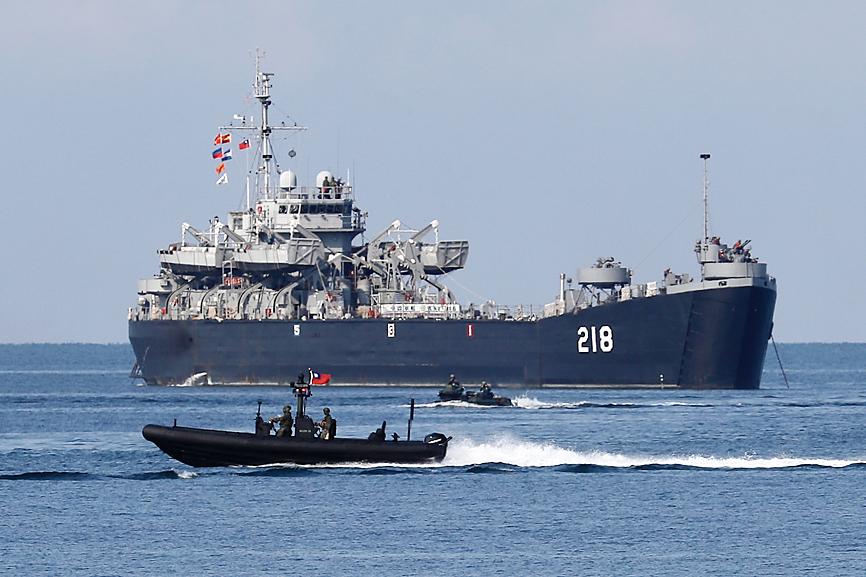The Executive Yuan plans to grow Taiwan’s defense budget by 4.09 percent for the next fiscal year, a ratio equal to the rate of GDP growth over the past three years, sources familiar with the matter said yesterday.
This would increase the Ministry of National Defense budget for the next fiscal year to NT$382.6 billion (US$12.78 billion), up from NT$367.6 billion this fiscal year, should the plan be accepted in its present form, they said.
President Tsai Ing-wen (蔡英文) is expected to approve the plan in the next few days, which would enable the Executive Yuan to present the budget to the legislature soon, they added.

Photo: EPA-EFE
“The growth rate of the next year’s defense budget is being planned on the principle that it should be no lower than the GDP growth over the past three years,” Directorate-General of Budget, Accounting and Statistics Minister Chu Tzer-ming (朱澤民) said when asked about the plan.
As national defense is a presidential prerogative, any plan relating to its budget originating from the Executive Yuan must obtain Tsai’s approval before it is considered by the Legislative Yuan, he said.
The general budget for the next fiscal year is scheduled to be presented to lawmakers next month, he said.
The sources said that the planned defense spending hike is a response to an escalating threat from China, which has continuously deployed aircraft and ships in military exercises around Taiwan.
In addition to boosting spending, the ministry is to receive additional funding in the form of the Sea-Air Combat Power Improvement Plan, a special budget for buying advanced weapons systems, including F-16V jets and domestically produced missiles, they said.
As the special budget is not included in the ministry’s regular spending, actual defense spending would exceed 4.09 percent, should Tsai approve the present plan, the sources said.
Meanwhile, the Ministry of Health and Welfare continued to receive the largest share of the budget, as current plans indicate that NT$2.54 trillion would be utilized to fund its programs in the next fiscal year, the sources said.
Social welfare programs were the biggest spending item in the draft general budget, with NT$690 billion being allocated, they added.
Much of that figure was accounted for by mandatory spending, such as subsidies for elderly people and disadvantaged groups that are required by law, the sources said, adding that maintaining entitlement programs remains one of the highest priorities.
As a result of the raises in welfare and defense spending, the government’s other ministries would likely lose large portions of their budgets, they said.

PREPAREDNESS: Given the difficulty of importing ammunition during wartime, the Ministry of National Defense said it would prioritize ‘coproduction’ partnerships A newly formed unit of the Marine Corps tasked with land-based security operations has recently replaced its aging, domestically produced rifles with more advanced, US-made M4A1 rifles, a source said yesterday. The unnamed source familiar with the matter said the First Security Battalion of the Marine Corps’ Air Defense and Base Guard Group has replaced its older T65K2 rifles, which have been in service since the late 1980s, with the newly received M4A1s. The source did not say exactly when the upgrade took place or how many M4A1s were issued to the battalion. The confirmation came after Chinese-language media reported

The Taiwanese passport ranked 33rd in a global listing of passports by convenience this month, rising three places from last month’s ranking, but matching its position in January last year. The Henley Passport Index, an international ranking of passports by the number of designations its holder can travel to without a visa, showed that the Taiwan passport enables holders to travel to 139 countries and territories without a visa. Singapore’s passport was ranked the most powerful with visa-free access to 192 destinations out of 227, according to the index published on Tuesday by UK-based migration investment consultancy firm Henley and Partners. Japan’s and

A Ministry of Foreign Affairs official yesterday said that a delegation that visited China for an APEC meeting did not receive any kind of treatment that downgraded Taiwan’s sovereignty. Department of International Organizations Director-General Jonathan Sun (孫儉元) said that he and a group of ministry officials visited Shenzhen, China, to attend the APEC Informal Senior Officials’ Meeting last month. The trip went “smoothly and safely” for all Taiwanese delegates, as the Chinese side arranged the trip in accordance with long-standing practices, Sun said at the ministry’s weekly briefing. The Taiwanese group did not encounter any political suppression, he said. Sun made the remarks when

BROAD AGREEMENT: The two are nearing a trade deal to reduce Taiwan’s tariff to 15% and a commitment for TSMC to build five more fabs, a ‘New York Times’ report said Taiwan and the US have reached a broad consensus on a trade deal, the Executive Yuan’s Office of Trade Negotiations said yesterday, after a report said that Washington is set to reduce Taiwan’s tariff rate to 15 percent. The New York Times on Monday reported that the two nations are nearing a trade deal to reduce Taiwan’s tariff rate to 15 percent and commit Taiwan Semiconductor Manufacturing Co (TSMC, 台積電) to building at least five more facilities in the US. “The agreement, which has been under negotiation for months, is being legally scrubbed and could be announced this month,” the paper said,